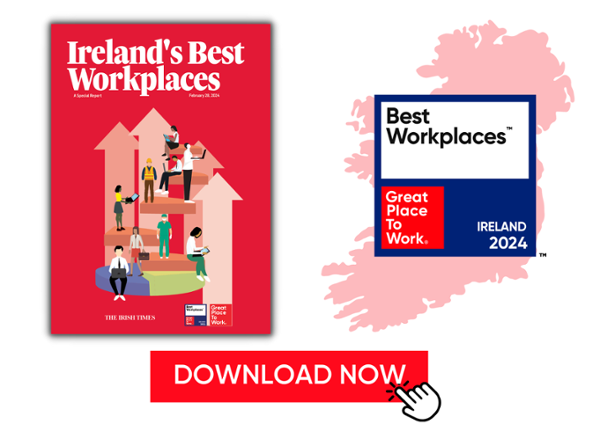We recently celebrated International Day of Persons with Disabilities. A United Nations-sanctioned day recognised annually, the UN cites its aim as the promotion of the rights and wellbeing of persons with disabilities in all spheres of society and development. One crucial sphere of society which has seen much-needed room for improvement is the inclusion of people with disabilities in the workplace.
According to the World Health Organisation, over 1 billion people live with some form of disability globally, corresponding to about 15% of the world’s population. In Ireland, nearly 650,000 people are reported to have at least one disability.
Yet high levels of discrimination due to issues like stereotypes and social exclusion unfortunately places people with disabilities at a vast disadvantage in the workplace. The everyday integration of practices in the workplace can help to ensure and promote equality for all people across the board. It's not enough to just do the bare minimum - we must go above and beyond to ensure equal opportunity for all, regardless of circumstance.
Assessing your organisation’s inclusivity practices
As it stands, Ireland currently has the lowest employment rate of disabled people in Europe. “[We are] acutely aware of how challenging the environment currently is for employers who are looking for skilled and talented personnel,” says Pierce Richardson, Employment Development Manager at the Disability Federation of Ireland. “At the same time, a lot of employers are consciously trying to further equality, diversity and inclusion in their places of work. By becoming a disability-confident employer and by bringing people with disabilities into the workplace, employers can potentially solve both these objectives.”
Pierce helps to support organisations on their journey to becoming more inclusive employers by offering support in an array of areas, such as great practices on recruiting a diverse and inclusive workforce, ensuring premises are accessible and providing disability inclusion training. As Pierce maintains, “people with disabilities are an untapped resource for employers”.
Great Practice: Company audits are an extremely beneficial way to keep track of what your organisation needs in terms of awareness and training. The National Tourism Development Authority, Fáilte Ireland, exhibits great practices around this – as a public sector organisation, Fáilte Ireland undertakes an annual disability audit and follows up on any highlighted actions. This helps foster a sense of mutual understanding on a companywide basis.
Openness and spreading awareness
Disabilities can be both visible and invisible, and people with disabilities face issues like unconscious bias and stigma in their everyday lives. For many, the workplace is an integral part of feeling included on a societal level. It's important that your organisation can be a place where this can be achieved and felt from the moment individuals start work.
It is important to ensure that all employees understand the importance of accessibility to cultivate an inclusive culture. For this reason, it is essential to put the appropriate procedures in place - practices like providing disability awareness training for staff and inviting speakers with first-hand experience are simple but necessary measures that go a long way. As well as this, asking colleagues with a disability (if they feel comfortable) to share any insight on issues they could face in the workplace and checking the correct terminology to use at all times will aid massively in helping to instill a safer working environment.
Great Practice: This type of training will not only benefit employees of your organisation, but potential customers as well. Fáilte Ireland also exemplifies this through training and resources for staff and through awareness guides on topics such as "accessible tourism" which can be utilised by tourism and hospitality providers. Through these guides, they detail how through awareness and understanding, staff in tourism businesses can play a key role in advancing the accessibility of their tourism experience through a more inclusive approach to customer service. Alongside these guides, Fáilte Ireland has also invested in case studies to showcase best practice for both Fáilte Ireland staff and the tourism industry.

Flexibility is key
Flexibility and communication in the workplace go hand in hand. From the recruitment stage up to accommodating for current employees, being open to adjustments is one of the key indicators of a progressive workplace. At the recruitment stage, something as simple as adding a statement to your job postings encouraging individuals with disabilities to apply shows you are willing to make any adjustments needed. These considerations should be in place at every stage of the recruitment process, so make sure you make these accommodations for the interview and training process too.
For current employees, flexibility could mean anything from adjusting working hours or modifying equipment. These adjustments will usually be on a case-by-case basis. Maintaining open communication with your employees around this is the most important step rather than assuming you know best. It also opens doors for higher levels of trust between employer and employee and creates a secure environment for any queries or doubts an employee may have.
Great Practice: Being open to and encouraging diversity is something important for software company Intercom, who offer an EDI scholarship valued at €10,000 for all students registered with UL Access, UL Sanctuary or Disability Support Services in the Immersive Software Engineering programme at the University of Limerick. Chief Technical Officer Darragh Curran emphasises how Intercom “need this opportunity to be accessible and inclusive to empower all students with an interest in technology to apply”.
Committing to building diverse teams is an absolute no-brainer in the current working world, where the advantages are second-to-none. Going the extra mile to provide equal access opportunities and cultivating a diverse workforce shows current and potential employees that your diversity and inclusion values aren’t just a mandatory part of your company policy, but that they are ingrained at the very core of your company culture.
Check out some more resources on inclusivity practices here:
About Great Place to Work®
Great Place to Work® is the global authority on workplace culture. We help organisations quantify their culture and produce better business results by creating a high-trust work experience for all employees. We recognise Great Place to Work-Certified™ companies and the Best Workplaces™ in more than 60 countries.
To join the thousands of companies that have committed to building high-trust company cultures that help them attract, retain and take care of their people, contact us about getting Certified today.
